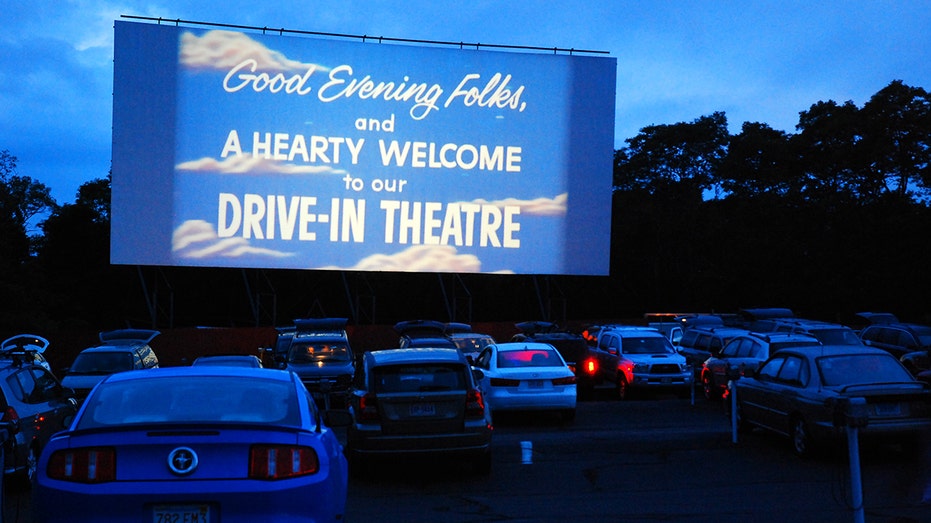Coach Meeting House owner Russ Lundstrum discusses how he transformed his restaurant into a drive-in movie theater that sells frozen drinks to customers.
The coronavirus pandemic has seemingly brought interest back to drive-in movie theaters as people try to stay apart while they seek entertainment. But, for some, it might not be clear why drive-in movie theaters went out of style in the first place.
Continue Reading Below
"You’re in your own car, away from other people, yet still have a chance to get out of the house and see a movie,” Schuyler Moore, an entertainment attorney at Greenberg Glusker in Los Angeles told FOX Business. “For most audiences right now, this is a lot more preferable than being packed in a confined, public space with dozens of other people."
HOW MANY DRIVE-IN MOVIE THEATERS ARE IN THE US?

Wellfleet, MA, USA July 8, 2009, The Wellfleet Drive-In welcomes its guests to their outdoor theater before the start of their feature movie. (iStock)
However, Moore doesn’t think the coronavirus will be enough of a push to revive the drive-in movie industry to its former glory.
"I wouldn’t count on drive-in movie theaters making a comeback anytime soon. The land would be too expensive in urban areas to justify them,” Moore added. “Most people prefer the full movie-going experience, and people will forget about COVID-19 eventually, especially once theaters are reopened with safety guidelines in place."
Drive-in movie theaters also cost less to operate and maintain than the regular theaters of today, according to Moore. Successful drive-ins in his experience are around five acres and have been commonly found in rural areas in the last few decades.
DRIVE-IN MOVIE THEATERS REOPEN AS CORONAVIRUS RESTRICTIONS EASE
Conversely, movie theater operation insiders have a different perspective on the amount of land needed as well as the strengths and failings of drive-in theaters.
"A decent-sized drive-in should be three-to-five acres at minimum," John Stefanopoulos, the manager of the Hudson Valley Four Brother's Drive-In told FOX Business. "Equipment was very expensive and so was the engineering of the screen and operating the concession stand on just a single screen or double feature per night."
Paul Turner, the owner and operator of Darkside Cinema in Corvallis, Oregon, on the other hand, once wrote on the popular question-and-answer website Quora that “a good sized drive-in sits on 15 acres,” and thrives during seasons that don't involve snow or rain, which makes profitability difficult. Time of day was another limiting factor that contributed to waned interest from moviegoers.
READ MORE ON FOX BUSINESS BY CLICKING HERE
"The decline of the drive-in was directly related to the movement away from Main Street America and towards the mall society, where convenience, times, weather and the idea of 'all-inclusive' became the popular way to enjoy a night out, pushing away the classic night out at the drive-in," Stefanopoulos elaborated. "More variety, the convenience of timing and shopping all in one and more focus on the movie itself rather than the experience was what the movie-goer demanded, and the mall society provided just that. Those social patterns caused drive-ins to close and give way, selling to the plazas we’ve grown to know today."
Drive-in movie theaters sometimes required more work than standard indoor theaters with visitors having to pack lawn chairs — a feat that made malls more appealing than drive-ins, Stefanopoulos added.
Moreover, the speakers in old school drive-ins didn’t provide the best audio quality compared to indoor ones. Though, Turner pointed out this isn’t as much of an issue with modern-day care stereos and FM radio.
CLICK HERE TO READ MORE ON FOX BUSINESS
Comfort and affordability were and still are perks of drive-in movie theaters, however, not every theater has been able to play digital films for audiences due to the high cost of high-resolution projectors. A 50,000 lumens 4K projector from Panasonic can be as high as $249,999, according to current listings from B&H.
Not being able to screen high-resolution films, therefore, limits the selection of first-run movies drive-in theaters can play, which ultimately plays a factor in the number of visitors a theater may receive.
"industry" - Google News
June 07, 2020 at 03:22AM
https://ift.tt/3h1EmrX
Why did the drive-in movie industry die? - Fox Business
"industry" - Google News
https://ift.tt/2RrQtUH
https://ift.tt/2zJ3SAW
Bagikan Berita Ini














0 Response to "Why did the drive-in movie industry die? - Fox Business"
Post a Comment